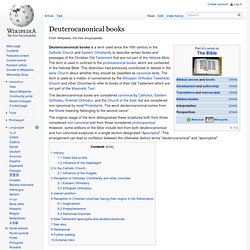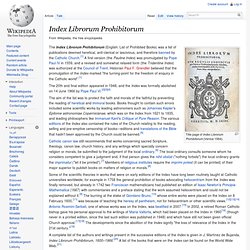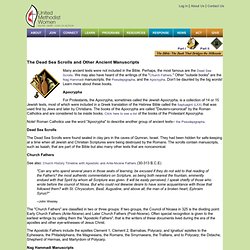

Deuterocanonical books. Deuterocanonical books is a term used since the 16th century in the Catholic Church and Eastern Christianity to describe certain books and passages of the Christian Old Testament that are not part of the Hebrew Bible.

The term is used in contrast to the protocanonical books, which are contained in the Hebrew Bible. This distinction had previously contributed to debate in the early Church about whether they should be classified as canonical texts. The term is used as a matter of convenience by the Ethiopian Orthodox Tewahedo Church and other Churches to refer to books of their Old Testament which are not part of the Masoretic Text. The deuterocanonical books are considered canonical by Catholics, Eastern Orthodox, Oriental Orthodox, and the Church of the East, but are considered non-canonical by most Protestants. The word deuterocanonical comes from the Greek meaning 'belonging to the second canon'. History[edit] Dead Sea scrolls[edit] Influence of the Septuagint[edit] Jewish position[edit] Index Librorum Prohibitorum. Title page of Index Librorum Prohibitorum (Venice 1564).

The Index Librorum Prohibitorum (English: List of Prohibited Books) was a list of publications deemed heretical, anti-clerical or lascivious, and therefore banned by the Catholic Church.[1] A first version (the Pauline Index) was promulgated by Pope Paul IV in 1559, and a revised and somewhat relaxed form (the Tridentine Index) was authorized at the Council of Trent. Historian Paul F. Grendler believed that the promulgation of the Index marked "the turning-point for the freedom of enquiry in the Catholic world".[1] The 20th and final edition appeared in 1948, and the Index was formally abolished on 14 June 1966 by Pope Paul VI.[2][3][4] The Bible: The Dead Sea Scrolls and Other Ancient Manuscripts. Part I Part II Many ancient texts were not included in the Bible.

Perhaps, the most famous are the Dead Sea Scrolls. We may also have heard of the writings of the "Church Fathers. " Other "outside books" are the Nag Hammadi manuscripts, the Pseudepigrapha, and the Apocrypha. Apocrypha For Protestants, the Apocrypha, sometimes called the Jewish Apocrypha, is a collection of 14 or 15 Jewish texts, most of which were included in a Greek translation of the Hebrew Bible called the Septuagint (LXX) that was used first by Jews and later by Christians. Note! Dead Sea Scrolls The Dead Sea Scrolls were found sealed in clay jars in the caves of Qumran, Israel.
Church Fathers See also: Church History Timeline with Apostolic and Ante-Nicene Fathers (30-313 B.C.E) "Can any who spend several years in those seats of learning, be excused if they do not add to that reading of the Fathers? Nag Hammadi Manuscripts Thirteen papyrus volumes of Gnostic and other texts were discovered in Nag Hammadi, Egypt in 1945. The Bible: Noncanonical Books (Ancient Manuscripts) Apocrypha. The Brick Testament. Digital Dead Sea Scrolls.